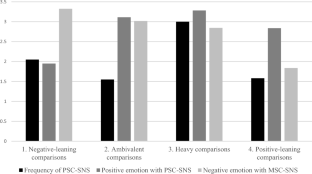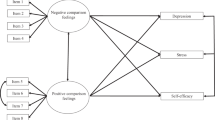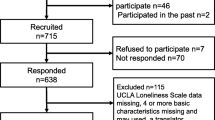Abstract
Purpose
Loneliness among mothers of infants is a serious problem that leads to increased stress and depression. Social networking sites (SNS) are platforms commonly used by mothers to gain information and socialize; however, the sites can also lead to social comparison. This study aimed to identify and compare the types of parental social comparisons on SNS among mothers with infants and examine their differences regarding maternal loneliness.
Methods
A random sampling cross-sectional survey of 233 Japanese mothers with infants aged 6–11 months old was conducted. The questionnaire considered the frequency of parental social comparisons on SNS and the associated positive/negative emotions, loneliness, perceived social support, SNS use, and participant characteristics. Hierarchical cluster analysis and analysis of covariance were used to examine differences in loneliness by social comparison type.
Results
Identified types of parental social comparisons on SNS included: “Negative-leaning comparisons (n = 40),” “Ambivalent comparisons (n = 53),” “Heavy comparisons (n = 39),” and “Positive-leaning comparisons (n = 67).” The “non-comparative group (n = 34)” made no comparisons. The loneliness scores of the “Negative-leaning comparisons” group were significantly higher than those of the “Ambivalent comparisons,” “Positive-leaning comparisons,” and “Non-comparative” groups (p = 0.019, p = 0.017, and p < 0.001, respectively). Additionally, the loneliness scores of the “Heavy comparisons” group were higher than those of the “Non-comparative” group (p = 0.005).
Conclusion
Interventions aimed at enhancing digital literacy among mothers and providing tailored support based on their social comparison types are crucial for mitigating the negative effects of parental social comparisons on SNS.


Similar content being viewed by others
Data availability
The datasets generated or analyzed during the current study are available from the corresponding author on reasonable request.
References
Cornwell EY, Waite LJ (2009) Social disconnectedness, perceived isolation, and health among older adults. J Health Soc Behav 50(1):31–48. https://doi.org/10.1177/002214650905000103
Peplau LA, Perlman D (1982) Perspectives on loneliness. In: Peplau LA, Perlman D (eds) Loneliness: A sourcebook of current theory, research and therapy. Wiley, pp 1–20
Au A, Chan YC, Cheung G, Yuen P, Lee T (2008) Examining the correlation between parenting stress and social support and loneliness in Chinese mothers living in a socially impoverished community in Hong Kong. J Psychol Chin Soc 9(2):167
Luoma I, Korhonen M, Salmelin RK, Helminen M, Tamminen T (2015) Long-term trajectories of maternal depressive symptoms and their antenatal predictors. J Affect Disord 170:30–38. https://doi.org/10.1016/j.jad.2014.08.017
Milner JS, Crouch JL, McCarthy RJ, Ammar J, Dominguez-Martinez R, Thomas CL, Jensen AP (2022) Child physical abuse risk factors: a systematic review and a meta-analysis. Aggress Violent Behav 66:101778. https://doi.org/10.1016/j.avb.2022.101778
Luoma I, Korhonen M, Puura K, Salmelin RK (2019) Maternal loneliness: concurrent and longitudinal associations with depressive symptoms and child adjustment. Psychol Health Med 24(6):667–679. https://doi.org/10.1080/13548506.2018.1554251
Nowland R, Necka EA, Cacioppo JT (2018) Loneliness and social internet use: pathways to reconnection in a digital world? Perspect Psychol Sci 13(1):70–87. https://doi.org/10.1177/1745691617713052
Clayton RB, Osborne RE, Miller BK, Oberle CD (2013) Loneliness, anxiousness, and substance use as predictors of facebook use. Comput Hum Behav 29(3):687–693. https://doi.org/10.1016/j.chb.2012.12.002
Lo J (2019) Exploring the buffer effect of receiving social support on lonely and emotionally unstable social networking users. Comput Hum Behav 90:103–116. https://doi.org/10.1016/j.chb.2018.08.052
Holt-Lunstad J, Smith TB, Layton JB (2010) Social relationships and mortality risk: a meta-analytic review. PLoS Med 7(7):e1000316. https://doi.org/10.1371/journal.pmed.1000316
Harpel T (2018) Pregnant women sharing pregnancy-related information on facebook: web-based survey study. J Med Internet Res 20(3):e115. https://doi.org/10.2196/jmir.7753
McDaniel BT, Coyne SM, Holmes EK (2012) New mothers and media use: associations between blogging, social networking, and maternal well-being. Matern Child Health J 16(7):1509–1517. https://doi.org/10.1007/s10995-011-0918-2
Gleeson DM, Craswell A, Jones CM (2019) Women’s use of social networking sites related to childbearing: an integrative review. Women and Birth 32(4):294–302. https://doi.org/10.1016/j.wombi.2018.10.010
Mandai M, Kaso M, Takahashi Y, Nakayama T (2018) Loneliness among mothers raising children under the age of 3 years and predictors with special reference to the use of SNS: a community-based cross-sectional study. BMC Women’s Health 18(1):131. https://doi.org/10.1186/s12905-018-0625-x
Coyne SM, McDaniel BT, Stockdale LA (2017) ‘Do you dare to compare?’ associations between maternal social comparisons on social networking sites and parenting, mental health, and romantic relationship outcomes. Comput Hum Behav 70:335–340. https://doi.org/10.1016/j.chb.2016.12.081
Radesky JS, Schumacher J, Zuckerman B (2015) Mobile and interactive media use by young children: the good, the bad, and the unknown. Pediatrics 135:1–3. https://doi.org/10.1542/peds.2014-2251
Festinger L (1954) A theory of social comparison processes. Hum Relat 7(2):117–140. https://doi.org/10.1177/001872675400700202
Verduyn P, Gugushvili N, Kross E (2021) The impact of social network sites on mental health: distinguishing active from passive use. World Psychiatry 20(1):133–134. https://doi.org/10.1002/wps.20820
Kross E, Verduyn P, Demiralp E, Park J, Lee DS, Lin N, Shablack H, Jonides J, Ybarra O (2013) Facebook use predicts declines in subjective well-being in young adults. PLoS ONE. https://doi.org/10.1371/journal.pone.0069841
Niu GF, Luo YJ, Sun XJ, Zhou ZK, Yu F, Yang SL, Zhao L (2018) Qzone use and depression among chinese adolescents: a moderated mediation model. J Affect Disord 231:58–62. https://doi.org/10.1016/j.jad.2018.01.013
Verduyn P, Lee DS, Park J, Shablack H, Orvell A, Bayer J, Ybarra O, Jonides J, Kross E (2015) Passive facebook usage undermines affective well-being: experimental and longitudinal evidence. J Exp Psychol Gen 144(2):480–488
Yang CC, Holden SM, Carter MDK (2018) Social media social comparison of ability (but not opinion) predicts lower identity clarity: identity processing style as a mediator. J Youth Adolesc 47(10):2114–2128. https://doi.org/10.1007/s10964-017-0801-6
Park SY, Baek YM (2018) Two faces of social comparison on Facebook: the interplay between social comparison orientation, emotions, and psychological well-being. Comput Hum Behav 79:83–93. https://doi.org/10.1016/j.chb.2017.10.028
Amaro LM, Joseph NT, de los Santos TM (2019) Relationships of online social comparison and parenting satisfaction among new mothers: the mediating roles of belonging and emotion. J Fam Commun 19(2):144–156. https://doi.org/10.1080/15267431.2019.1586711
de los Santos TM, Amaro LM, Joseph NT (2019) Social comparison and emotion across social networking sites for mothers. Commun Rep 32(2):82–97. https://doi.org/10.1080/08934215.2019.1610470
Dibb B, Foster M (2021) Loneliness and facebook use: the role of social comparison and rumination. Heliyon 7(1):e05999. https://doi.org/10.1016/j.heliyon.2021.e05999
Yang CC (2016) Instagram use, loneliness, and social comparison orientation: interact and browse on social media, but don’t compare. Cyberpsychol Behav Soc Netw 19(12):703–708. https://doi.org/10.1089/cyber.2016.0201
Modecki KL, Low-Choy S, Uink BN, Vernon L, Correia H, Andrews K (2020) Tuning into the real effect of smartphone use on parenting: a multiverse analysis. J Child Psychol Psychiatry 61(8):855–865. https://doi.org/10.1111/jcpp.13282
Sharma A et al (2021) A consensus based checklist for reporting of survey studies CROSS. J Gen Intern Med 36(10):3179–3187. https://doi.org/10.1007/s11606-021-06737-1
Ellison NB, Boyd D (2013) Sociality through social network sites. In: Dutton W (ed) The Oxford handbook of internet studies. Oxford University Press, pp 151–172
Arimoto A, Tadaka E (2019) Reliability and validity of japanese versions of the ucla loneliness scale version 3 for use among mothers with infants and toddlers: a cross-sectional study. BMC Women’s Health 19(1):105. https://doi.org/10.1186/s12905-019-0792-4
Iwasa H, Gondou Y, Masui Y, Inagaki H, Kawai C, Otsuka R, Ogawa M, Takayama M, Imuta H, Suzuki T (2007) reliability and validity of the japanese version of the multidimensional scale of perceived social support scale: examination of middle-aged and older adults] nihongoban “sosyaru sapoto syakudo” no shinraisei narabini datousei: tyukounensya wo taisyo to shita kento. Kousei no Shihyo 54(6):26–33 (in Japanese)
Dahlem NW, Zimet GD, Walker RR (1991) The multidimensional scale of perceived social support: a confirmation study. J Clin Psychol 47(6):756–761. https://doi.org/10.1002/1097-4679(199111)47:6%3c756::aid-jclp2270470605%3e3.0.co;2-l
Zimet GD, Dahlem NW, Zimet SG, Farley GK (1988) The multidimensional scale of perceived social support. J Pers Assess 52(1):30–41. https://doi.org/10.1207/s15327752jpa5201_2
Zimet GD, Powell SS, Farley GK, Werkman S, Berkoff KA (1990) Psychometric characteristics of the multidimensional scale of perceived social support. J Pers Assess 55(3–4):610–617. https://doi.org/10.1080/00223891.1990.9674095
Smith RH (2000) Assimilative and contrastive emotional reactions to upward and downward social comparisons. In: Suls J, Wheeler L (eds) Handbook of social comparison: Theory and research. Springer, pp 173–200
Wallace L, James TL, Warkentin M (2017) How do you feel about your friends? understanding situational envy in online social networks. Inf Manag 54(5):669–682. https://doi.org/10.1016/j.im.2016.12.010
Yoon S, Kleinman M, Mertz J, Brannick M (2019) Is social network site usage related to depression? a meta-analysis of Facebook–depression relations. J Affect Disord 248:65–72. https://doi.org/10.1016/j.jad.2019.01.026
Jang K, Park N, Song H (2016) Social comparison on Facebook: its antecedents and psychological outcomes. Comput Hum Behav 62:147–154. https://doi.org/10.1016/j.chb.2016.03.082
Martin KA, Leary MR, Rejeski WJ (2000) Self-presentational concerns in older adults: implications for health and well-being. Basic Appl Soc Psychol 22(3):169–179. https://doi.org/10.1207/S15324834BASP2203_5
Xie J, He Z, Burnett G, Cheng Y (2021) How do mothers exchange parenting-related information in online communities? A meta-synthesis Comput Hum Behav 115:106631. https://doi.org/10.1016/j.chb.2020.106631
Kushlev K, Leitao MR (2020) The effects of smartphones on well-being: theoretical integration and research agenda. Curr Opin Psychol 36:77–82. https://doi.org/10.1016/j.copsyc.2020.05.001
Arimoto A, Tadaka E (2021) Individual, family, and community factors related to loneliness in mothers raising children less than 3 years of age: A cross-sectional study. BMC Womens Health 21(1):226. https://doi.org/10.1186/s12905-021-01365-7
Nomura S, Kisugi N, Endo K, Omori T (2023) Parental loneliness, perceptions of parenting, and psychosocial factors among parents having new children during the COVID-19 pandemic. Glob Health Med 5(5):158–168
O’Day EB, Heimberg RG (2021) Social media use, social anxiety, and loneliness: a systematic review. Comput Hum Behav Rep 3:100070. https://doi.org/10.1016/j.chbr.2021.100070
Acknowledgements
The authors would like to express their gratitude to the mothers who participated in the study and cooperated with the research team.
Funding
This work was supported by the Japan Society for the Promotion of Science KAKENHI (grant no. 19K19728, Grant-in-Aid for Young Scientists). Japan Society for the Promotion of Science, 19K19728.
Author information
Authors and Affiliations
Contributions
All authors contributed to the study conception and design. Material preparation and data collection were performed by Ryuta Onishi and Hnami Tone. Data analysis were performed by All authors. The first draft of the manuscript was written by Ryuta Onishi and all authors commented on previous versions of the manuscript. All authors read and approved the final manuscript.
Corresponding author
Ethics declarations
Competing interests
The authors declare no competing interests.
Conflict of interest
We have no conflicts of interest to declare.
Ethical approval
This study was conducted with the approval of the ethical review board of the Faculty of Health Sciences, Hokkaido University (Approval Number: 20–2) and performed in line with the principles of the Declaration of Helsinki.
Consent to participate
If the participants returned the completed questionnaire, they were judged to have consented to participate in the study.
Consent to publication
Not applicable.
Supplementary Information
Below is the link to the electronic supplementary material.
Rights and permissions
Springer Nature or its licensor (e.g. a society or other partner) holds exclusive rights to this article under a publishing agreement with the author(s) or other rightsholder(s); author self-archiving of the accepted manuscript version of this article is solely governed by the terms of such publishing agreement and applicable law.
About this article
Cite this article
Onishi, R., Tone, H., Maruyama, F. et al. Identifying and comparing types of social comparisons on social networking sites among mothers with infants: Differences in maternal loneliness by types. Soc Psychiatry Psychiatr Epidemiol (2024). https://doi.org/10.1007/s00127-024-02677-3
Received:
Accepted:
Published:
DOI: https://doi.org/10.1007/s00127-024-02677-3




